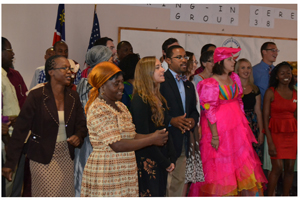
The new American Peace Corps volunteers took their oath of service last week marking the beginning of a journey that will enrich both them and the Namibians they teach.
41 American Peace Corps Volunteers took a formal oath of service last week and performed a traditional Namibian song to show their appreciation to their host families. At the ceremony, held at the Andreas Kukuri Conference Centre in Okahandja, US Embassy Public Affairs Officer, Priscilla Hernandez said “Namibian families host Peace Corps trainees while they are learning about Namibia’s rich culture and [while they are] in training for their two years of volunteer service in Namibia.
” The volunteers travel to Namibian towns and villages where they work alongside community members for meaningful and sustainable community development. The volunteers teach English in schools, assist with economic development projects, and exchange cross-cultural experiences with their local partners. The new Peace Corps Volunteers include 22 women, 19 men, and three married couples with an average age of 29. Twenty eight Volunteers are English teachers and 13 will focus on small enterprise development. Since Independence, the government and people of Namibia have welcomed more than 1,200 Peace Corps Volunteers who learned Namibian languages, lived in local communities, worked alongside local partners, and made lasting contributions to development. Peace Corps volunteers assist local communities with small enterprise and entrepreneurship development, help learners with learning English, mathematics, science, and how to use computers. Addressing hygiene and health is a further area of focus for the voluteers The US Embassy said the Peace Corps helps to address unemployment by sending American volunteers to communities to promote youth entrepreneurship, help small and medium enterprises improve their operations, and teach financial and marketing skills to aspiring entrepreneurs in partnership with the Ministry of Education, the Ministry of Youth and other local organisations. Volunteers also teach English, maths, science, computer literacy, and life skills in upper primary and secondary schools, partnering with the Ministry of Education. They provide technical and managerial support at libraries and IT support at regional ministry offices. They also support and strengthen public health concerns including HIV/AIDS and tuberculosis. They teach life skills to exposed young people and promote healthy behavioural change in concert with the Ministry of Health and Social Services and the Ministry of Youth, National Service, Sports and Culture.


